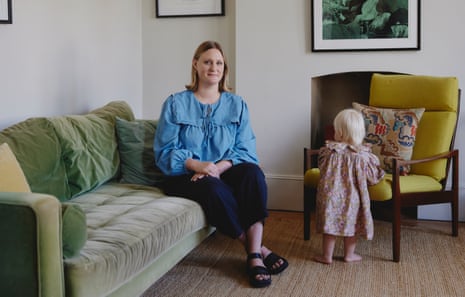Health
Woman Diagnosed with Rare Visual Snow Syndrome After Months of Struggles

In February 2023, a woman from London began experiencing unusual visual disturbances that led to a diagnosis of a rare condition known as visual snow syndrome. Emma Loffhagen, who had recently transitioned from being a wedding cake-maker to a food stylist, found herself juggling family life with two young children and a burgeoning career. After noticing flashing lights in her vision, she initially attributed her symptoms to stress and fatigue.
Struggling for Answers
As her symptoms progressed, Loffhagen described her vision as overwhelmingly bright and static-like, akin to looking through a veil of snow. This heightened sensitivity to light made daily life increasingly challenging. Despite visiting the A&E department on multiple occasions, medical professionals reassured her that her eyes were healthy, suggesting that her condition might merely be a migraine.
However, the symptoms persisted, leading Loffhagen to document her experiences, including intense after-images and severe light sensitivity. The situation escalated when she struggled to see her son’s face while putting him to bed, prompting her to seek further medical advice. After a series of tests, including an MRI scan, which returned clear results, Loffhagen began to question her own perceptions and whether others believed her experiences.
A Rare Diagnosis and Its Impact
In April 2023, a private neurologist confirmed Loffhagen’s diagnosis of visual snow syndrome, a condition that affects approximately 2% of the UK population. Despite validation of her symptoms, Loffhagen faced the disheartening reality that there is limited knowledge about the syndrome and no known cure. Although the neurologist offered medication typically used for epilepsy, she opted not to pursue it, given the uncertainty of its effectiveness.
Adjusting to her new reality has been difficult. Loffhagen now frequently wears sunglasses indoors to cope with her light sensitivity, which she describes as both necessary and embarrassing. Social situations have become overwhelming; a recent outing to a friend’s hen do ended in tears when the venue’s flashing lights became too much to handle. “I can’t even hang out with my friends and just feel normal,” she reflected.
Her four-year-old son has started to understand the situation, even advising his father to keep the blinds closed to avoid hurting his mother’s eyes. Loffhagen expressed her desire to be fully present for her children, stating, “It affects my sleep, too. I wake in the night, every night, with shaky hands, fuzzy vision, and that same foggy heaviness in my head.”
To gain more support, Loffhagen is exploring a clinical trial at St Thomas’s Hospital in London and considering joining a support group through the Visual Snow Initiative in the United States. The uncertainty surrounding her condition weighs heavily on her mind. “Will it ever go away? Will it get worse?” she questions, grappling with the loneliness of her situation, which remains invisible to outsiders.
Despite these challenges, Loffhagen continues to manage her work responsibilities. She emphasizes the importance of having a support network and seeks to raise awareness about visual snow syndrome, hoping to connect with others who share similar experiences. Her journey highlights the complexities of dealing with a rare condition that, while often overlooked, can significantly impact daily life.
-

 Health3 months ago
Health3 months agoNeurologist Warns Excessive Use of Supplements Can Harm Brain
-

 Health3 months ago
Health3 months agoFiona Phillips’ Husband Shares Heartfelt Update on Her Alzheimer’s Journey
-

 Science2 months ago
Science2 months agoBrian Cox Addresses Claims of Alien Probe in 3I/ATLAS Discovery
-

 Science2 months ago
Science2 months agoNASA Investigates Unusual Comet 3I/ATLAS; New Findings Emerge
-

 Science1 month ago
Science1 month agoScientists Examine 3I/ATLAS: Alien Artifact or Cosmic Oddity?
-

 Entertainment5 months ago
Entertainment5 months agoKerry Katona Discusses Future Baby Plans and Brian McFadden’s Wedding
-

 Science1 month ago
Science1 month agoNASA Investigates Speedy Object 3I/ATLAS, Sparking Speculation
-

 Entertainment4 months ago
Entertainment4 months agoEmmerdale Faces Tension as Dylan and April’s Lives Hang in the Balance
-

 World3 months ago
World3 months agoCole Palmer’s Cryptic Message to Kobbie Mainoo Following Loan Talks
-

 Entertainment2 months ago
Entertainment2 months agoLewis Cope Addresses Accusations of Dance Training Advantage
-

 Science1 month ago
Science1 month agoNASA Scientists Explore Origins of 3I/ATLAS, a Fast-Moving Visitor
-

 Entertainment4 months ago
Entertainment4 months agoMajor Cast Changes at Coronation Street: Exits and Returns in 2025









